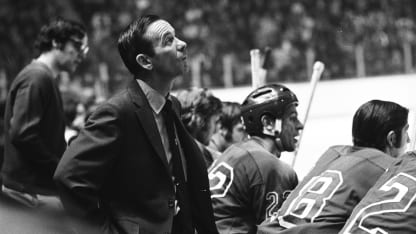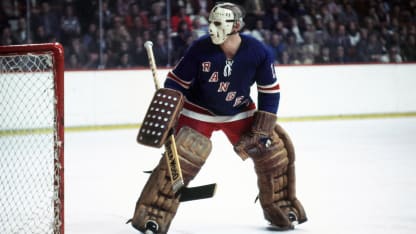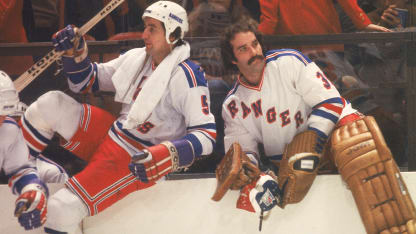But in 1975, Francis was leaning toward newcomer John Davidson. Giacomin's return to the Garden with Detroit was one of the most emotional nights in Rangers history; the Red Wings defeated the Rangers 6-4, with the full house bellowing its love of Giacomin through the entire game.
"Here's the problem: Both of Eddie's knees were gone," Francis says. "I knew that the year before, when I made the deal with St. Louis to get Davidson, to groom him to be our next goalkeeper. But I couldn't use [Davidson] at Madison Square Garden. 'Ed-die! Ed-die!' the fans always chanted. I knew if I was ever going to get [Davidson] ready to play for the Rangers, he's got to be able to play in the home rink.
"[Giacomin] had done so much for our team. I tried to trade him but nobody wanted him. So I put him on waivers and who picks him up but Detroit, who's coming in next game."
Francis laughs at the memory of the chants for Giacomin drowning out the national anthem, and recalls that his own conflicted players didn't want to shoot on their former teammate.
"The last 10 minutes of the game, they start: 'Kill The Cat! Kill The Cat!' " Francis says of the fans. "The game ends and the Garden police say, 'When it's time to go, we've got to escort you out of this building.' I told them, 'I came into this building on my own, I'm leaving on my own.' I said, 'They may get me but I'll guarantee you, I'll take a couple of those [guys] with me.' I walked right out through the rotunda, through the middle of the crowd, straight to my car."
Francis helped develop some of the Rangers' greatest players of the day: Rod Gilbert, Jean Ratelle, Vic Hadfield, Jim Neilson and Rod Seiling. He drafted others, including Brad Park, Walt Tkaczuk, Bill Fairbairn and Ron Greschner. A week after waiving Giacomin, Francis further stunned New York when he sent Park, a brilliant defenseman, No. 1 center Ratelle and young defenseman Joe Zanussi to the Boston Bruins for forward Phil Esposito and defenseman Carol Vadnais.





